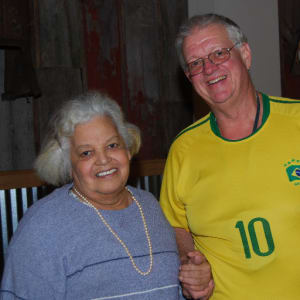John O.

About John O.
Ten-year struggle with two different cancers
My bride, Maria Otte, was diagnosed with breast cancer in May 2010. She had a double mastectomy, one chemo therapy treatment followed by Methicillin Resistant Staphylococcus Aureus in the blood, MRSA in the lungs and Klebsiella pneumonia in the blood. She spent three weeks in hospitals to treat those infections.
Maria wanted no more chemo. I was braced for a struggle convincing her to continue. Her oncologist told her, “I do not think you are a very good candidate for any more chemo therapy.”
We switched to radiation.
Maria maintained that somewhere among those 33 treatments, a substitute technician burned her.
Add dementia to the mix
In 2012, a neurologist diagnosed Maria with some sort of dementia. My guess is she had it five years before we knew it. I doubt that all the chemistry doctors threw at her to treat those post-chemo infections helped her brain.
In April 2015 my job became a budget casualty. That was fortuitous. Getting let go allowed me to shift from part-time caregiver to full-time caregiver.
In December 2015 Maria started oozing pus. Doctors diagnosed radiation breakdown. Three surgeries solved that issue—for a while. Then Maria could not stop scratching. She created an open wound. I feared it would get infected. We tried various treatments. When the wound did not get infected within a year, I worried less about infections.
On March 3, 2020, Maria died in her native homeland, Brazil. Based on an odor that Maria’s sister, Clara, and I had been noticing, the doctor, who signed Maria’s death certificate, told us that he thought she was eaten up inside with cancer. We buried her in Brazil the day she died.
All stress went away
About a month after Maria died, I was talking to my sister on skype. Nancy said, “You sound happy.”
I replied, “I am.” Why? A whole list of bad things that I feared would happen, no longer could happen. Maria could no longer fall and break something. She could not get an infection. She could not become bed ridden. She could not end up in a nursing home. Her brain could no longer become an empty shell.
We were truly blessed that Maria clocked out while we all still had some fairly recent memories of the good times we all shared.
PSA comes in at 5.6
Covid 19 delayed my return to the United States. In July, an acquaintance took me to a urologist for other conditions. Blood tests showed my PSA at 5.6, marginally above the 4.0 top end of the normal range.
Back in the U.S. in September my PSA was still 5.6, but up from 4.3 in October 2017. Family doctor noted that my prostate was “Hard and asymmetrical.” He referred me to a urologist.
Urologist suggested a biopsy. At the time he took samples in October, he told me my prostate was three times normal size. I suspected that was not good news.
I was helping my brother on his farm when the urologist called. His news—all 12 samples had cancer. Gleason scores ranged from seven to nine. My brother listened on the speaker phone. He said, “You took that diagnosis better than I would have.” I responded, “I’ve been dealing with cancer for ten years.”
Surgery vs. radiation
Each time I visited the urologist or surgeon I took a second set of ears. Discussions suggested cure rate of radiation and surgery were similar. Surgery required an overnight stay in the hospital. Radiation would be 40 plus treatments.
Based on Maria’s experience with radiation, I was better prepared, psychologically, for surgery.
I had laparoscopic prostatectomy on Dec. 17, 2020. It went well. Gas pain was way more intense than I expected. Belly pain was nowhere near as intense as I had with hernia surgery in 2004.
Surgeon removed nine lymph nodes as well. Pathology report showed nine of nine lymph nodes negative for cancer. That is very constructive.
Blood tests end of March will potentially shed light on whether cancer has set up shop elsewhere.
An unexpected side effect
An old adage says, “Knowledge is what you get if you read the fine print. Experience is what you get if you don’t.”
I had read quite a bit about prostate cancer. But I had managed to miss the fine print that reads: Many men are unprepared for the extent to which they may experience bladder leaks after prostate removal and it can be disheartening to have undergone surgery only to experience a loss of bladder control for a period afterward. Fortunately, this is usually resolved within a year.
Those of you who are speculating that my failure to seek knowledge is now resulting in me gaining experience are correct. “Experience” is discouraging me from going out hobnobbing among folk where I might encounter someone spewing covid 19. Fortunately, the last line of the fine print provides hope that the flooding will abate. So does my physical therapist. She thinks I will one day regain control.
Cutline for photo: John Otte was primary caregiver for his wife, Maria, before he was diagnosed with prostate cancer.









